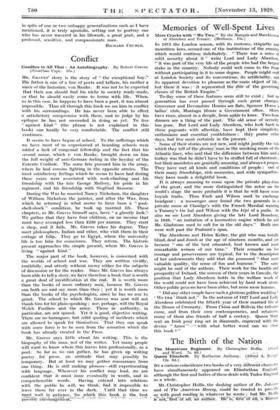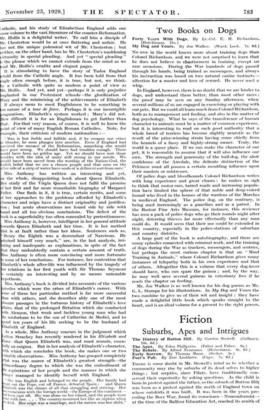The Birth of the Nation ,
The Monstrous Regiment. - By Christopher Hollis. • (Sheed Queen Elizabeth. By fiatherine Anthony.(Alfred A: 4inopf. - 12.a. ed.) _ . ,. :. _ =.- . ... . , -.
BY a curious coincidence two books of a very different character have simultaneously appeared on Elizabethan England, although the first and better of these deals with Tudor England as a whole.
Mr. Christopher Hollis, the dashing anthor of Dr. Johnson and of The American Heresy, could be trusted to provide us with good reading in whatever he wrote ; but Mr. Hollis is ii747-riirsnif all; an aVithni. —lir is-,`-ffist.-iir all, -si-gbman
Catholic, and his study of Elizabethan England adds one more volume to the vast literature of the counter-Reformation.
Mr. Hollis is a delightful writer. To call him a disciple of Mr. Chesterton would be at once flattering and unfair. He as not- the unique polemical wit of Mr. Chesterton ; but either, on the other hand, has he Mr. Chesterton's maddening 'irtuosity in special pleading. And yet " special pleading " s the phrase which we cannot extrude from the mind as we ead Mr. Hollis's erudite and elegant pages.
It is stimulating to have the story of Tudor England etold from the Catholic angle. It has been told from that ngle often enough before, it is true, but not, we think, y a Catholic with quite so modern a point of view as fr. Hollis. And yet, and yet—perhaps it is only prejudice iplanted in our Protestant schools—the glorification of fary and the minimizing of the achievements of Elizabeth :11 always seem to most Englishmen to be something in le nature of a tour de force. Perhaps it is our incorrigible rag,matism. Elizabeth's system worked ; Mary's did not. ow difficult it is for an Englishman to get further than hat. For that very reason, of course, it is well to know the oint of view of many English Roman Catholics. Note, for xample, their criticism of modern nationalism :-
" Man is but feeble and fallible and, if he escapes one crime • blunder, he soon plunges into another. Even if England had urvived the menace of the Reformation, something else would eve gone wrong. We should have had troubles enough. There ould have been no golden age. Yet we should have met those roubles with the idea of unity still strong in our minds. We hould have been saved from the worship of the Nation-God, the cash belief that we are a chosen people and that men on the tiler side of a strip of water have souls of a different sort from ours."
Miss Anthony has written an interesting and yet, in the whole, disappointing book about Queen Elizabeth. er study of the Virgin Queen does not fulfil the promise if her first and far more remarkable biography of Margaret uller. One finds in it, it is true, certain merits, and some if her approaches to the problems afforded by Elizabeth's haracter and reign have a distinct originality and justifica- :on ; but acute observations are found side by side with anal and all too obvious conclusions. The defect of the ook is a superficiality too often concealed by pretentiousness. Miss Anthony is, however, intelligent in her general attitude owards Queen Elizabeth and her time. It is her method
hat is at fault rather than her ideas. Sentences such as, ' Henry the Eighth was a descendant of Narcissus. He clinked himself very much," are, in the last analysis, irri- ating and inadequate as explanations, in spite of the fact hat they undoubtedly contain a certain amount of truth. liss Anthony is often more convincing and more fortunate n some of her conclusions. For instance, her contention that lizabeth's whole after-life was influenced by the tragedy of er relations in her first youth with Sir Thomas Seymour certainly an interesting and by no means untenable ypothesis.
Miss Anthony's book is divided into accounts of the various pisodes which were the crises of Elizabeth's career. With me of them her particular method is far more successful han with others, and she describes ably one of the most bseure passages in the tortuous history of Elizabeth's love (fairs, that of the prolonged flirtation which she conducted ith Alencon, that weak and luckless young man who had he misfortune to be the son of Catherine de Medici, and to pend ten years of his life seeking to be the husband of lizabeth of England.
As a whole, Miss Anthony concurs in the judgment which vtton Strachey has recently rendered in his Elizabeth and ssex —that Queen Elizabeth was, and must remain, essen- jay an enigma. But in her analysis of Elizabeth's character, ill which she concludes the book, she makes one or two .aluable observations. Miss Anthony has grasped completely hat was the source of Elizabeth's greatest strength—the Vraordinary degree to which she was the embodiment of he aspirations of her people and the manner in which she lways managed to identify herself with England.
" She was English and belonged to the people. Her family had ept out the Pope, cut off France, defeated Spain : and Queen izabeth was the climax of all that struggling and striving. Her st connexion with the foreign world—the Europe of the contment- d been cast off. She was alone on her island, and the people were lone with her. . . . The country mourned her like an orphan when died. Her-reign Was a-insirinage, iind-the-nation-wai-her child."































































 Previous page
Previous page